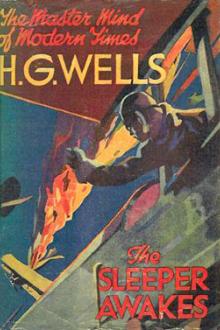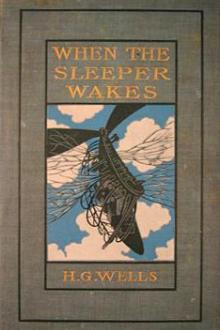The Sleeper Awakes, H. G. Wells [ap literature book list .txt] 📗

- Author: H. G. Wells
- Performer: -
Book online «The Sleeper Awakes, H. G. Wells [ap literature book list .txt] 📗». Author H. G. Wells
He became aware of a growing fatigue. At times he would turn aside and sit down on one of the numerous benches of the upper ways. But a feverish restlessness, the knowledge of his vital implication in this struggle, would not let him rest in any place for long. Was the struggle on his behalf alone?
And then in a desolate place came the shock of an earthquake—a roaring and thundering—a mighty wind of cold air pouring through the city, the smash of glass, the slip and thud of falling masonry—a series of gigantic concussions. A mass of glass and ironwork fell from the remote roofs into the middle gallery, not a hundred yards away from him, and in the distance were shouts and running. He, too, was startled to an aimless activity, and ran first one way and then as aimlessly back.
A man came running towards him. His self-control returned. “What have they blown up?” asked the man breathlessly. “That was an explosion,” and before Graham could speak he had hurried on.
The great buildings rose dimly, veiled by a perplexing twilight, albeit the rivulet of sky above was now bright with day. He noted many strange features, understanding none at the time; he even spelt out many of the inscriptions in Phonetic lettering. But what profit is it to decipher a confusion of odd-looking letters resolving itself, after painful strain of eye and mind, into “Here is Eadhamite,” or, “Labour Bureau—Little Side”? Grotesque thought, that all these cliff-like houses were his!
The perversity of his experience came to him vividly. In actual fact he had made such a leap in time as romancers have imagined again and again. And that fact realised, he had been prepared. His mind had, as it were, seated itself for a spectacle. And no spectacle unfolded itself, but a great vague danger, unsympathetic shadows and veils of darkness. Somewhere through the labyrinthine obscurity his death sought him. Would he, after all, be killed before he saw? It might be that even at the next corner his destruction ambushed. A great desire to see, a great longing to know, arose in him.
He became fearful of corners. It seemed to him that there was safety in concealment. Where could he hide to be inconspicuous when the lights returned? At last he sat down upon a seat in a recess on one of the higher ways, conceiving he was alone there.
He squeezed his knuckles into his weary eyes. Suppose when he looked again he found the dark trough of parallel ways and that intolerable altitude of edifice gone. Suppose he were to discover the whole story of these last few days, the awakening, the shouting multitudes, the darkness and the fighting, a phantasmagoria, a new and more vivid sort of dream. It must be a dream; it was so inconsecutive, so reasonless. Why were the people fighting for him? Why should this saner world regard him as Owner and Master?
So he thought, sitting blinded, and then he looked again, half hoping in spite of his ears to see some familiar aspect of the life of the nineteenth century, to see, perhaps, the little harbour of Boscastle about him, the cliffs of Pentargen, or the bedroom of his home. But fact takes no heed of human hopes. A squad of men with a black banner tramped athwart the nearer shadows, intent on conflict, and beyond rose that giddy wall of frontage, vast and dark, with the dim incomprehensible lettering showing faintly on its face.
“It is no dream,” he said, “no dream.” And he bowed his face upon his hands.
CHAPTER XI. — THE OLD MAN WHO KNEW EVERYTHING
He was startled by a cough close at hand.
He turned sharply, and peering, saw a small, hunched-up figure sitting a couple of yards off in the shadow of the enclosure.
“Have ye any news?” asked the high-pitched wheezy voice of a very old man.
Graham hesitated. “None,” he said.
“I stay here till the lights come again,” said the old man. “These blue scoundrels are everywhere—everywhere.”
Graham’s answer was inarticulate assent. He tried to see the old man but the darkness hid his face. He wanted very much to respond, to talk, but he did not know how to begin.
“Dark and damnable,” said the old man suddenly. “Dark and damnable. Turned out of my room among all these dangers.”
“That’s hard,” ventured Graham. “That’s hard on you.”
“Darkness. An old man lost in the darkness. And all the world gone mad. War and fighting. The police beaten and rogues abroad. Why don’t they bring some negroes to protect us? ... No more dark passages for me. I fell over a dead man.”
“You’re safer with company,” said the old man, “if it’s company of the right sort,” and peered frankly. He rose suddenly and came towards Graham.
Apparently the scrutiny was satisfactory. The old man sat down as if relieved to be no longer alone. “Eh!” he said, “but this is a terrible time! War and fighting, and the dead lying there—men, strong men, dying in the dark. Sons! I have three sons. God knows where they are to-night.”
The voice ceased. Then repeated quavering: “God knows where they are to-night.”
Graham stood revolving a question that should not betray his ignorance. Again the old man’s voice ended the pause.
“This Ostrog will win,” he said. “He will win. And what the world will be like under him no one can tell. My sons are under the wind-vanes, all three. One of my daughters-in-law was his mistress for a while. His mistress! We’re not common people. Though they’ve sent me to wander to-night and take my chance.... I knew what was going on. Before most people. But this darkness! And to fall over a dead body suddenly in the dark!”
His wheezy breathing could be heard.
“Ostrog!” said Graham.
“The greatest Boss the world has ever seen,” said the voice.
Graham ransacked his mind. “The Council has few friends among the people,” he hazarded.
“Few friends. And poor ones at that. They’ve had their time. Eh! They should have kept to the clever ones. But twice they held election. And Ostrog—. And now it has burst out and nothing can stay it, nothing can stay it. Twice they rejected Ostrog—Ostrog the Boss. I heard of his rages at the time—he was terrible. Heaven save them! For nothing on earth can now he has raised the Labour Companies upon them. No one else would have dared. All the blue canvas armed and marching! He will go through with it. He will go through.”
He was silent for a little while. “This Sleeper,” he said, and stopped.
“Yes,” said Graham. “Well?”
The senile voice sank to a confidential whisper, the dim, pale face came close. “The real Sleeper—”
“Yes,” said Graham.
“Died years ago.”
“What?” said Graham, sharply.
“Years ago. Died. Years ago.”
“You don’t say so!” said Graham.
“I do. I do say so. He died. This Sleeper who’s woke up—they changed in the night. A poor, drugged insensible creature. But I mustn’t tell all I know. I mustn’t tell all I know.”
For a little while he muttered inaudibly. His secret was too much for him. “I don’t know the ones that put him to sleep—that was before my time—but I know the man who injected the stimulants and woke him again. It was ten to one—wake or kill. Wake or kill. Ostrog’s way.”
Graham was so astonished at these things that he had to interrupt, to make the old man repeat his words, to re-question vaguely, before he was sure of the meaning and folly of what he heard. And his awakening had not been natural! Was that an old man’s senile superstition, too, or had it any truth in it? Feeling in the dark corners of his memory, he presently came on something that might conceivably be an impression of some such stimulating effect. It dawned upon him that he had happened upon a lucky encounter, that at last he might learn something of the new age. The old man wheezed awhile and spat, and then the piping, reminiscent voice resumed:
“The first time they rejected him. I’ve followed it all.”
“Rejected whom?” said Graham. “The Sleeper?”
“Sleeper? No. Ostrog. He was terrible—terrible! And he was promised then, promised certainly the next time. Fools they were—not to be more afraid of him. Now all the city’s his millstone, and such as we dust ground upon it. Dust ground upon it. Until he set to work—the workers cut each other’s throats, and murdered a Chinaman or a Labour policeman at times, and left the rest of us in peace. Dead bodies! Robbing! Darkness! Such a thing hasn’t been this gross of years. Eh!—but ‘tis ill on small folks when the great fall out! It’s ill.”
“Did you say—there had not been—what?—for a gross of years?”
“Eh?” said the old man.
The old man said something about clipping his words, and made him repeat this a third time. “Fighting and slaying, and weapons in hand, and fools bawling freedom and the like,” said the old man. “Not in all my life has there been that. These are like the old days—for sure—when the Paris people broke out—three gross of years ago. That’s what I mean hasn’t been. But it’s the world’s way. It had to come back. I know. I know. This five years Ostrog has been working, and there has been trouble and trouble, and hunger and threats and high talk and arms. Blue canvas and murmurs. No one safe. Everything sliding and slipping. And now here we are! Revolt and fighting, and the Council come to its end.”
“You are rather well-informed on these things,” said Graham.
“I know what I hear. It isn’t all Babble Machine with me.”
“No,” said Graham, wondering what Babble Machine might be. “And you are certain this Ostrog—you are certain Ostrog organised this rebellion and arranged for the waking of the Sleeper? Just to assert himself—because he was not elected to the Council?”
“Everyone knows that, I should think,” said the old man. “Except—just fools. He meant to be master somehow. In the Council or not. Everyone who knows anything knows that. And here we are with dead bodies lying in the dark! Why, where have you been if you haven’t heard all about the trouble between Ostrog and the Verneys? And what do you think the troubles are about? The Sleeper? Eh? You think the Sleeper’s real and woke of his own accord—eh?”
“I’m a dull man, older than I look, and forgetful,” said Graham. “Lots of things that have happened—especially of late years—. If I was the Sleeper, to tell you the truth, I couldn’t know less about them.”
“Eh!” said the voice. “Old, are you? You don’t sound so very old! But it’s not everyone keeps his memory to my time of life—truly. But these notorious things! But you’re not so old as me—not nearly so old as me. Well! I ought not to judge other men by myself, perhaps. I’m young—for so old a man. Maybe you’re old for so





Comments (0)